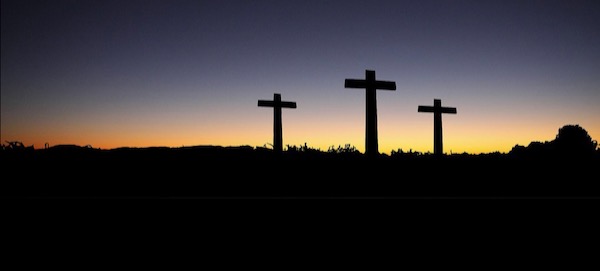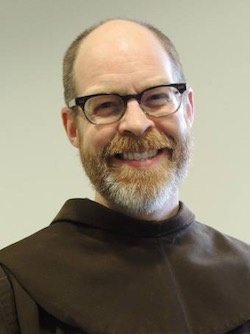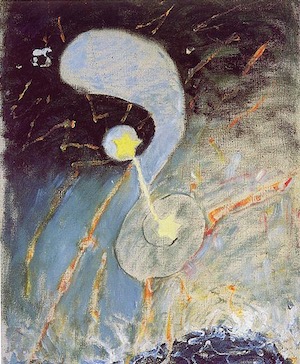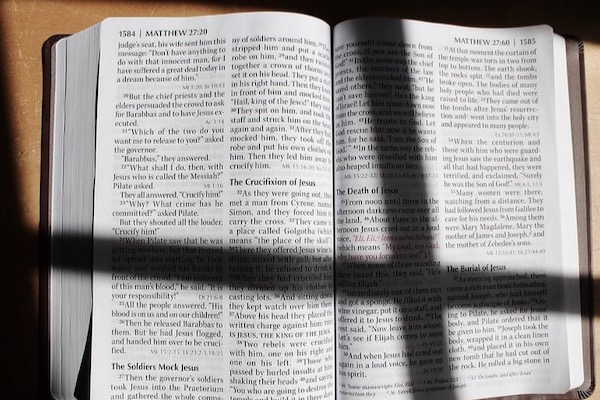Franciscan Joy: Trust in God; be not afraid

Peace and Joy
For years I have been teaching Introduction to the Old Testament to new graduate students at Catholic Theological Union in Chicago. The first thing we talk about in that course is chaos – what it is, how the Bible talks about, and what God generally does with chaos. It turns out that chaos – in the form of social unrest, personal distress, or upheavals in the natural world – is surprisingly prevalent in the Bible. And so a good part of the Bible is taken up with exploring the nature of chaos and how God responds to it.

Br. John Barker, OFM
My students are usually pretty surprised to discover that chaos and God’s response to it (which we call “creation”) is such a central theme in the Bible. But it actually makes sense, because chaos is a universal and chronic feature of the human experience, and the Bible is nothing if not realistic about the human experience.
This year we are being invited to experience the Paschal Mystery by focusing on the stark reality of chaos as it has invaded our world in recent weeks. This is painful, and frightening, and confusing. But pain, fright, and confusion are a universal and chronic feature of the human experience, and in Holy Week we are reminded that Jesus of Nazareth, the Word-made-flesh, entered into the human experience in its fullness. We are being invited to slow down our move to Easter and to contemplate the mystery of human suffering and God’s response to it, which is not to take it away, but to bring us through it and to transform us, just as Jesus went through his suffering and was transformed.
Franciscan joy, when it comes down to it, is not about being constantly upbeat and optimistic. The story goes, after all, that Francis himself thought that we achieve “perfect joy” only when we are able to endure pain and rejection and fear with peace and calm and trust in God. That’s a hard thing to hear when we are experiencing chaos, but I think that’s when it’s most meaningful.

Chaos by Hilma af Klint (1906)
Most of us probably won’t hear the Gospel reading for the Easter Vigil this year, which is from Matthew (28:1-10). This is what happens: Mary Magdalene and “the other Mary” come to Jesus’ tomb, only to find an angel sitting on the stone that once covered the entrance to the tomb. Everyone is afraid: What is this? What’s going on? What does the angel say? “Do not be afraid!” Later, Jesus greets his disciples and the first thing he says to them is also, “Do not be afraid.” The divine world knows that the human world is frightening, sometimes terrifying, because it is chaotic and uncertain and painful. This is why the single most common divine command in the Bible – in both Testaments – is, “Do not be afraid.”
Franciscan joy is Christian joy, and Christian joy does not mean always being upbeat and carefree. After all, when the women left the empty tomb, they left “fearful yet overjoyed.” I think Christian joy is more often quiet, thoughtful, and peaceful, because it is rooted in a deep trust that even in fearful, chaotic times, God remains present in our lives and in the world. There is no way to get around this: Joy can only happen when we face our fears with trust in God. This is hard, very hard, and I will be the first to admit that I am not always a particularly joyful person in the face of hardship. Still, we are being told this week, “Do not be afraid.” And what better time to hear that?
For most of my life, I think I have gone into Easter without giving the deeper meaning of Holy Week much thought. Or, maybe I should say, without immersing myself in the experience of Holy Week – the experience of pain, sorrow, confusion, and fear. Well, this year I am being invited to do that. And as much as I really don’t want to do that, it’s probably a good thing. For one thing, I am able to pray more profoundly and authentically for my sisters and brothers throughout the world who experience chaos much more regularly than I do. For another, I am able to allow God to dig down deeper into my heart and to show me the true meaning of Easter joy, which is found only when we are staring at the chaos in our lives and in the world and yet still can somehow trust that there is nothing, truly, to be afraid of.
This is God’s grace. I am hoping to experience some of that this year, and I hope that all of you will, too. Peace and joy in this most chaotic of Easters.
(John R. Barker is Associate Professor of Old Testament Studies and Chair of Biblical Literature and Languages at Catholic Theological Union in Chicago, Ill.)
This story originally appeared on Franciscan.org

Posted in: Lent and Easter
